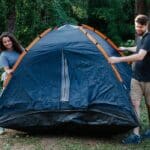I found myself sitting around a campfire surrounded by strangers at two o’clock in the morning in the high desert just outside of Bryce Canyon National Park. We were at an aid station at mile 80 of the 100-mile Bryce Canyon Ultra Marathon.
Every so often, a zombie dressed as a runner would stumble into the fire light from out of the cold and darkness. I was waiting for my zombie to arrive so that I could give him aid and run with him for the last 20 miles of his race.
As I sat there waiting, a runner came stumbling up to the fire, sat down, then immediately threw up. After cleaning herself up the best she could and with her head still between her knees, she mumbled to no one in particular, “This is a stupid sport!”
After this profound proclamation, she got up, helped herself to some self-serve M&Ms on the communal table, refilled her water bottles, and trudged off into the night to join the zombie migration to the finish line.
I have often felt the same way while tired, dirty, and sore multiple days into a backpacking trip. Like ultramarathoning, ultralight backpacking is a ridiculous sport. I will think in self-pity before picking up my ultralight pack and setting off the trail toward some arbitrary finish line.
What is the Point of Ultralight Backpacking
You would think from the introduction that I don’t like ultralight backpacking, but that is not true. I enjoy it despite, or maybe because of, the challenges and difficulties we face on the trail. I enjoy it because of the incredibly beautiful places it has taken me and the relationships I have developed and cultivated along the way.

If you’re unsure what I’m talking about here, you’re in the right place to learn more about what ultralight backpacking is.
Everyone has their own “why” when it comes to ultralight backpacking, and as the saying goes, if the purpose is greater than pain, purpose wins. While it is always fun to feel smug and superior because of the size of your pack, ultralight just for the sake of ultralight is not the reason that I do it.
There are many reasons to get into ultralight backpacking. Usually, it is a progression from traditional backpacking to lightweight backpacking to ultralight as your mileage increases or your knees get worse.
I enjoy moving long distances through the wilderness efficiently, and ultralight backpacking allows me to do that.
Ultralight backpacking is not for everyone but if it fits into your “why,” it can be amazing.
For me, ultralight backpacking is the most fun when there is a balance between purpose, skill, fitness, and equipment. One follows the other like dominos. I know it will be a good trip when all of these things line up.
1. Purpose
It starts with a map and a dream. I am unsure how much of my life has been spent poring over maps, but it is significant. When I was younger, it was paper maps. I still have a box full of paper maps in my closet.
Now I’ve moved on to electronic maps, but the point is still the same: to come up with a route that inspires and to some degree scares me.
2. Fitness
After my purpose is set and I have convinced my wife to let me go, I work on training my fitness. There are some people out there that can do this kind of stuff “off the couch,” but I find that I am not one of them. I usually train for specific trips and find that I enjoy them more when I am prepared physically for the challenge.

3. Skill
Skill comes with not only experience but with a conscious effort to become better. As your skill level increases, you can rely less on gear. When planning a trip, it is essential to know your skill level and the level of skill of your companions because as the gear gets lighter, the margin for error shrinks.
4. Gear
Last comes gear selection. I try to tailor my kit to the specific conditions I will find. I don’t try for a specific base weight. Instead, I take the lightest weight that I feel will be safe and try to balance comfort while hiking with safety and comfort in camp.
Is Ultralight Backpacking Gear Worth It?
I was preparing for my very first true ultralight backpacking trip. In the past, I had dabbled a bit here and there with ultralight gear but had never fully committed. I had planned a 150-mile trip in the mountains around Stanley in Central Idaho.
The plan was to spend five days hiking through the White Cloud Mountains, the Frank Church Wilderness Area, and the Sawtooth Mountains.
I marveled at how light my gear was. I was also trying to hide from my long-suffering wife due to how much of our retirement I had spent to make it happen. Instead of showing her my new (and expensive) sleeping quilt and tent, I showed her my cat food can that I had converted into a cooking stove. See, not all ultralight gear has to be expensive.
As I started out, it was amazing how great it felt and how easily the miles flew by. This was the perfect combination of purpose, fitness, skill, and gear. I don’t even have any funny stories to tell because everything went so smoothly. Kind of a bummer, really.
It is a trip I will remember for the rest of my life, and it would not have been possible if I had to haul around a massive pack that weighed a ton.

Advantages of Going Ultralight
- Can go farther
- Easier on the joints
- Makes the hiking part of backpacking more enjoyable
- Ultralight gear has become easier to find
- Looks cool
Disadvantages of Ultralight Backpacking Gear
- Harder to find in traditional brick-and-mortar stores
- Can be less comfortable
- May be more fragile
- Often ultra-expensive
- Easy to outpace skill and experience and get in over your head
Ultralight gear is definitely worth it when you have the skills and experience to use it, and it fits into the purpose of the trip that you want to do. But if you just want to sit around camp in comfort and eat like a king, by all means, carry a ridiculously heavy pack.
When It’s Dumb
One fall day, two friends and I woke up in one of the best places in the whole world to wake up, on the edge of the Grand Canyon. The goal was to hike down the rugged, remote, and beautiful Thunder River Trail and camp on Tapeats Creek. The next day we planned on hiking back out the way we came.
To save weight, we took two tarps that we would tie together to create a shelter. After getting the tarps set up, it was immediately apparent that it would not be big enough to fit all three of us comfortably.
We rock, paper, and scissored for who would get the highly coveted middle spot. I lost and had to sleep on the less desirable side.
Overnight it rained and between the rain leaking in and the condensation from the three of us breathing all night, I and the other loser were soaking wet. When we woke up in the morning, the guy in the middle sat up completely dry and well-rested. He looked at the two of us on the sides and said, “I feel like a pretty princess.”
In our attempt to carry less weight, we compromised our good night’s sleep and ended up having to carry soaking-wet sleeping bags out of the Grand Canyon.
In case you were curious, here is a list of some of the best tents for backpacking. You won’t find blue tarps from Walmart on this list!
It is easy to get caught up in trying to drop as much weight as you can from your pack, but it becomes dumb when you save ounces but gain pounds. Even worse is when you go too light and it endangers your safety.
In Conclusion, Ultralight Backpacking is Ridiculous
In our modern day, when it is possible to jump on a jet and be halfway around the world in comfort, it seems ridiculous to pack a small, light pack and head off into the woods.
However, there is something immensely satisfying about going places that can only be reached by your own two feet and the sweat of your brow. And the further away it is from any form of civilization the better.
When done right, ultralight backpacking isn’t ridiculous at all. In fact, it can be sublime.





